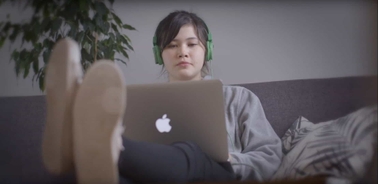- Home
- News And Events
- News
- Looking After Your Well-being & Studying Remotely
Looking after your well-being & studying remotely

While some students chose from the outset to study remotely, the recent worldwide spread of the COVID-19 virus is forcing many universities and schools to move their students to a remote classroom. This can come as an unwelcome change.
Many people moving to studying remotely are, I believe, grateful for being able to ensure the continuity of their studies, safely, from the comfort of their homes despite the pandemic hitting the world in successive waves. For some, however, being suddenly weaned from campus and the class environments, friends, breaks and the study groups can be unsettling. Especially for those of us who are extroverted and get our energy from interacting with others. The introverts among us on the other hand might find it very relaxing not to have to cope with so many interruptions and be able to concentrate on studying!
Based on more than 15 years of working remotely, I am happy to share some simple dos and don’ts to make the experience smoother for those who have to learn in little time a new way of being a student in class, and organizing the days to come. I can vouch that it has in no way impaired my productivity in all these years or made me a less effective leader. However, I recognize there are growing pains associated with this shift.
• Organize your day as if you were going to class in normal circumstances: have a start/stop time and schedule your working sessions with colleagues using technology (WhatsApp, Slack, Skype, Zoom, etc.). Share those times with your teams so they know when you are available.
• Plan your breaks as if you were at university. These breaks can be either to have a meal, a snack or to exercise, even though you cannot leave your home. Try those home working-out or yoga apps or set yourself a challenge with a group of friends. Minding the body’s needs for nutrients (not just food) and exercise is incredibly important for at least 30 minutes a day.
• Identify a place where you will study – ideally in a place in your home that is different to where you spend your relaxed or family time.
• Use a good quality set of headphones so that everyone one can hear you properly when you connect.
• Learn to mute yourself when you are not speaking so that a) no one has to listen to your “Darth Vader” heavy breathing thanks to your excellent quality headphones (see above!) and b) the unexpected event which happens around you (delivery, barking dog, crying child) does not take over the whole meeting.
• Be mindful of the view people will have when you join with video, and make sure you are comfortable with what your peers will see. You might also be patient and understanding with those fellow students who are not able to set up the environment you would expect due to the constraint of their homes.
• Equally important is your personal appearance, what people see of you should be as professional as possible (e.g. no need to slouch on the couch!); it’s not because you work from home that you should look sloppy (at least from the top up!).
• If you have a group activity for your homework, schedule a weekly team meeting to manage priorities for the week, and if you are a team lead schedule a 1:1 check-in with each team member, especially at the beginning when everyone is learning this new modus operandi. As a team member, you can also reach out individually to your teammates to see how they are managing. Everyone is in the same boat and will need to be looked after – you could simply ask them “how are you feeling about this new way of studying?”.
• You can use various apps (WhatsApp) to set up a group chat where the team can share quick updates with each other outside the Inbox environment. You might need to set the rules there, so it does not turn into a new inbox. The same goes for group projects, there are several apps that can be used to share progress.
• Use the Pomodoro technique if you find yourself procrastinating too much. It’s a time management technique, that breaks down your day into intervals of 25 minutes. There are lots of apps you can download to help you.
• Test the e-coffee experience by scheduling a coffee break with fellow students like you used to do on campus. The first time is undeniably weird, but you will learn to enjoy them as much as the real ones. Using video is a must!
• Be aware of your state of mind and ask for help if the new situation is creating an excess of anxiety for you. You can meditate or do yoga to re-center yourself (Calm, Insight Timer, Headspace...). If those fail to support you, chose any other exercise type that will bring your anxiety down. Cold showers also help to relieve stress.
• Remember to enjoy the varied benefits of:
- Avoiding commute time which gives you more time for leisure,
- Enjoying the presence of your pet,
- Eating what you like when you like,
- Watering your plants,
- Cleaning your drawers,
- Not having to wear shoes?!
- … and no doubt many more!
• Finally, be generous with your friends, professors and fellow students while we all learn to study in this new way and laugh at the mishaps that are bound to happen.
Please share your own tips, as you embark on this journey, or if you are a veteran remote student. I have to say that it is incredibly impressive that in just 2 weeks, IEU was able to move its students to a remote classroom environment.
Happy learning!